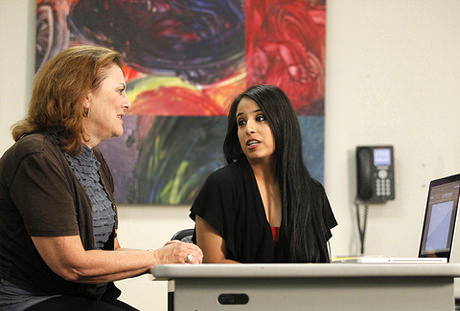Experience the benefits…
CompSAT facilitates reflection and authentic assessment.
CompSAT is a tool for authentic assessment of your knowledge, skills, and dispositions in the context of the California ECE Competencies. Authentic assessment starts with what you already know and are able to do, and then challenges you to look at your work through multiple lenses. CompSAT engages you in reflection and dialogue, both catalysts for growth and change.
CompSAT provides protocols that guide learning.
CompSAT presents two protocols, that is, ways of thinking about your work. The Keys to Reflection and Inquiry is a protocol that helps you examine important aspects of your practice related to each of the Competencies. The Portfolio Guide includes a protocol to help you assess your progress and document the outcomes of your growth.
The protocols are powerful tools that cultivate habits of mind and intentional, reasoned actions. These protocols empower you to become a self-directed learner. Through them you will discover a way to manage and address the many topics within the performance areas found in each competency.
CompSAT promotes positive dispositions.
What dispositions do you bring to your work? Dispositions, or habits of mind guide the everyday choices you make. CompSAT prompts you to examine your values and beliefs about children and the role of adults in children's learning. You may discover that you have some unexamined biases. Your perspectives might be different from those of the people around you. Being reflective can open up possibilities for productive dialogue and personal growth. Dispositions, your attitudes and beliefs underlie all of your decisions and your actions. And intentionally cultivating positive dispositions takes your work to a new level.
Examine your dispositions and explore your values.
It's easy to get caught up in the countless tasks and the "how-to's" of everyday practice. However, intentionally cultivating useful dispositions can take your work to a new level. Dispositions underlie all of your decisions and your actions with children and families.
Our experiences and perspectives influence how we see things. Explore your values about children and the role of adults in children's learning. You may discover that you have some unexamined biases. Your cultural perspectives might be different than those around you. Being reflective helps you open up possibilities for productive dialogue about conflicting values.
Create programs worthy of children
ECE programs matter in the lives of young children. Let's not waste their time. Rather, let's fill it with meaningful and enriching experiences that build their minds, bodies, and spirits.
Realize more joy in your work
Revisit, in yourself, the joy of discovery and the wonder of learning. Revel in the delights of the world through the eyes of children.
Gain deeper insights into teaching and learning
Phil Collins reminds us that "In learning you will teach, and in teaching you will learn." This is one of the most important lesson early care and education offers us.
Go from job to career
A job pays the bills. But a career…An old Chinese proverb tell us that "…if you would be happy for life, love your work."
Stimulate your motivation to learn more
Exercise your intellectual muscles. Sarah Caldwell implores us to "Learn everything you can, anytime you can, from anyone you can, there will always come a time when you will be grateful you did."
Incorporate the Competencies into your work
A hallmark of where we are in early care and education, the ECE Competencies provide early educators with a blueprint for high quality ECE practice.
Be inspired to take action
Action leads to real, lasting change. Be your own best advocate by acting to improve your knowledge, skills, and dispositions.
Strengthen relationships
Relationships are the foundation of our humanity. Authentic,respectful relationships can transcend power, roles, and differences, and bring us into each other's lives in ways that change us.
Expand your professional portfolio
So much effort and care go into your work with children and families. Portfolios give you a way to preserve that work and grow from it.



